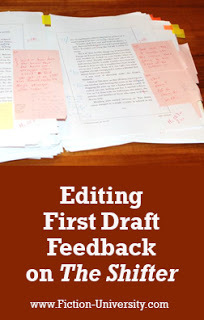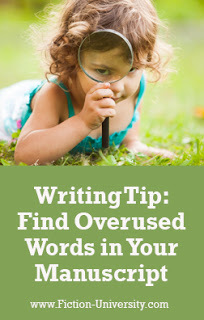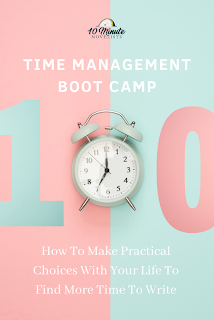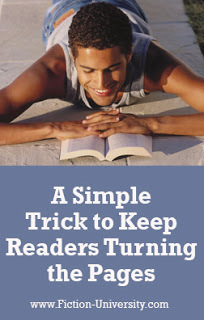Janice Hardy's Blog, page 55
January 27, 2020
Things to Consider When Adding a Point of View Character
 By Janice Hardy. @Janice_Hardy
By Janice Hardy. @Janice_HardyAnother pair of eyes can add richness to a story, but is it the right thing to do for your novel?
I was once about halfway through a first draft when I realized the story was a bit bigger than I'd first thought. There was a lot of tale to tell that my protagonist wasn't involved in, and seeing that side of the story through another character's eyes would benefit the novel as a whole.
Of course, this novel was written in first person, so adding another point of view character also added a myriad of problems to solve. Considering the work involved to add that second point of view, I wanted to make sure it was the right call for the novel before I started mucking around in it.
Having Second Thoughts
I'd originally plotted this novel as my protagonist’s story. I'd planned goals for her, conflicts for her, given her personal stakes and a character arc, etc. It was her story.
Until it wasn't. At least not completely.
Continue ReadingWritten by Janice Hardy. Fiction-University.com
Published on January 27, 2020 03:00
January 23, 2020
Writers: Make a List of Personal Influencers
 By Sara Megibow, @SaraMegibow
By Sara Megibow, @SaraMegibow Part of The Writer's Life Series
JH: When it comes to publicity and promotion, we often have more resources than we think. Agent Sara Megibow shares tips on making the most of your personal influencers--those people in your life who can and will help you promote your book.
Sara Megibow is a literary agent with kt literary out of Highlands Ranch, CO. She has worked in publishing since 2006 and represents New York Times bestsellers authors including Margaret Rogerson, Roni Loren, Jason M. Hough and Jaleigh Johnson. She specializes in launching debut authors and working on long-term career development and profit strategy with them. She is a graduate of Northwestern University with degrees in Women’s Studies, Gender Studies and American History. Always LGBTQ+ Friendly!
Website | Twitter | Publishers Marketplace | Manuscript Wishlist | Submission Guidelines
Take it away Sara...
Continue ReadingWritten by Janice Hardy. Fiction-University.com
Published on January 23, 2020 03:09
January 21, 2020
4 Mistakes Amateur Self-Publishers Make That the Pros Don’t
 By Dave Chesson, @DaveChesson
By Dave Chesson, @DaveChessonPart of The Indie Authors Series
JH: It's easy to make mistakes when venturing into self publishing. Dave Chesson shares four mistakes new authors make when they go indie, and shows us how to fix them.
Dave Chesson is the founder of Kindlepreneur.com and creator of Publisher Rocket, a software that helps authors market their books more effectively.
Website | Twitter | Facebook
Take it away Dave…
Self-publishing can be pretty intimidating for new authors. It’s easy to make mistakes without knowing you’re making them, and with competition stiff nowadays, being on top of your game has never been more important.
Continue ReadingWritten by Janice Hardy. Fiction-University.com
Published on January 21, 2020 04:00
January 20, 2020
Following Directions: Editing First Draft Feedback on The Shifter
 By Janice Hardy, @Janice_Hardy
By Janice Hardy, @Janice_HardyEver wonder what the original draft of a published novel looked like? Here's a peek behind the curtain and a look into the critiquing process.
Every Saturday I critique someone's work and post it for all to see, but I've also done the same to my own opening page. Fair's fair.
I came across this early post from 2010 where I showed excerpts from the very first draft of The Shifter (back when it was still The Pain Merchants), and the feedback I'd received from my critique group. Not only did I share what they said, I shared what I did, and explained why I found the comment helpful.
I've always been interested in the thought process and decision-making behind writing, so hopefully this will help other writers apply the feedback from their own critiques. It might even give them some insight into why they might have gotten a particular comment.
Continue ReadingWritten by Janice Hardy. Fiction-University.com
Published on January 20, 2020 03:00
January 19, 2020
Sunday Writing Tip: A Trick for Finding Overused Words in Your Manuscript
 By Janice Hardy, @Janice_Hardy
By Janice Hardy, @Janice_Hardy Each week, I’ll offer a tip you can take and apply to your manuscript to help improve it. They’ll be easy to do and shouldn’t take long, so they’ll be tips you can do without taking up your Sunday. Though I do reserve the right to offer a good tip now and then that will take longer—but only because it would apply to the entire manuscript.
This week’s tip is a bit different, but one I find incredibly useful. It’s my favorite trick to easily spot specific words or phrases.
To find all occurrences of a single word in a manuscript, do a search for it and replace it with the same word in bold and red.
That makes whatever you’re searching for pop out. Not only will it be easier to find, you’ll be able to clearly see how many times you’ve used that word of phrase on a page. The bold red stands out even when you zoom out of the page and can’t read the exact words anymore.
Continue ReadingWritten by Janice Hardy. Fiction-University.com
Published on January 19, 2020 04:41
January 18, 2020
Real Life Diagnostics: Which Opening Page Is Better in This Historical Mystery?
 Critique By Janice Hardy, @Janice_Hardy
Critique By Janice Hardy, @Janice_HardyReal Life Diagnostics is a weekly column that studies a snippet of a work in progress for specific issues. Readers are encouraged to send in work with questions, and we diagnose it on the site. It’s part critique, part example, and designed to help the submitter as well as anyone else having a similar problem.
If you're interested in submitting to Real Life Diagnostics, please check out these guidelines.
Submissions currently in the queue: Three
Please Note: As of today, critique slots are booked through February 15.
This week’s questions:
The first excerpt is how I begin the book. I'm setting the stage and introducing the main character. Action does occur in the first scene but after I set things up. My question is, is that okay or should I put the main action first to create more of a hook?
I rewrote the scene with the action happening first but then I'm not sure how to put in the information I think the readers need without slowing down the pace.
Market/Genre: Historical Mystery
On to the diagnosis…
Continue ReadingWritten by Janice Hardy. Fiction-University.com
Published on January 18, 2020 05:39
January 17, 2020
How to Accomplish More in 2020
 By Janice Hardy, @Janice_Hardy
By Janice Hardy, @Janice_HardyYou can get a lot done in a whatever time you have—if you manage that time well.
Even if you’re not a writer, managing your time is still a useful skill to have. I think just about everyone leads far busier lives now than we used to, and it’s getting harder and harder to cross off every task on our To-Do Lists. If you’re juggling a day job, school, a family, and writing a novel (or any combination of those), the hours vanish before you’ve had time to take a breath.
Katharine Grubb knows what this is like, and she’s put a lot of time and effort into finding ways to solve some of those problems. She’s launching a ten-week Time Management Boot Camp on January 20, to share principles on how to guard your time and energy, eliminate distractions, and build your confidence.
Continue ReadingWritten by Janice Hardy. Fiction-University.com
Published on January 17, 2020 03:29
January 16, 2020
The Core of Every Novel: The Big Want & The Big Fear
 By Spencer Ellsworth, @spencimus
By Spencer Ellsworth, @spencimusPart of The How They Do It Series
JH: As complicated as novels are, they really do come down to some very simple things. Spencer Ellsworth shares two of them.
Spencer Ellsworth has been writing since he learned how. He is the author of The Great Faerie Strike , a tale of the Otherworld’s first labor union, from Broken Eye Books. He is also the author of the space opera Starfire Trilogy from Tor, and many other short works. He lives in Bellingham, WA, with his wife and three children, works at a small tribal college, and would really like a war mammoth, please.
Website | Twitter | Goodreads
Take it away Spencer…
Continue ReadingWritten by Janice Hardy. Fiction-University.com
Published on January 16, 2020 03:00
January 15, 2020
A Simple Trick to Keep Readers Turning the Pages
 By Janice Hardy, @Janice_Hardy
By Janice Hardy, @Janice_Hardy Scene and chapter breaks are the most likely places to lose a reader. Are yours doing all they can to keep them reading?
On Monday, I talked about writing without chapters, and one of the benefits of that was choosing the best places to end my scenes and chapters. Today, I want to elaborate on that a bit.
When I was still new to writing, I thought a scene or a chapter was a contained bit of the story. It started, and then it wrapped up by the end. It might talk about what to do next, but that happened in the next chapter. I made the same mistakes pretty much every new writer does. I ended scenes with:
Characters going to bedCharacters setting off somewhereCharacters achieving a goal and being happy about itCharacters musing about the next day or the next taskObvious foreshadowing of doom (dum-dum-DUM!)Melodramatic cliffhangers with characters in trouble or shocking revelationsThere are ways to make every single one of these work, but more often than not, they aren’t strong endings and don’t provide the best hooks for enticing readers to turn the page.
Continue ReadingWritten by Janice Hardy. Fiction-University.com
Published on January 15, 2020 04:16
January 14, 2020
Want to Get Published? Read This.
 By Laurence MacNaughton, @LMacNaughton
By Laurence MacNaughton, @LMacNaughtonPart of The Writer's Life Series
JH: Writers write, but they also read. Laurence MacNaughton shares thoughts and tips on why reading is vital for writers.
I’ve talked to dozens of best-selling authors about their early years, before they were published. And the similarities between them are striking.
On average, they wrote about half a dozen unpublished manuscripts before they sold a novel. (By the way, this is what I call the Myth of the First Novel. Because it's hardly ever the first novel they wrote. Just the first one to get published.)
Aside from cranking out thousands of pages of prose, there's one thing they all do furiously:
They read every day.
Continue ReadingWritten by Janice Hardy. Fiction-University.com
Published on January 14, 2020 03:00



